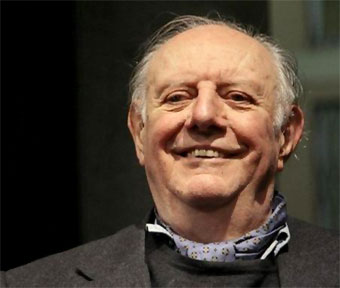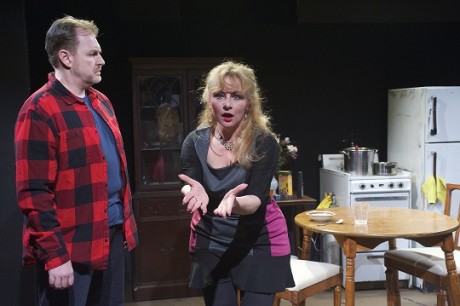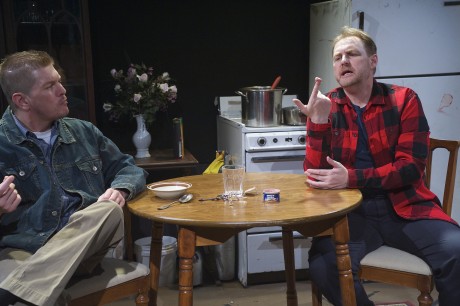“Our homeland is the whole world.
Our law is liberty. We have but one thought,
Revolution in our hearts” – Dario Fo
If Dario Fo were to cast a vote in the forthcoming US Presidential election his choice no doubt would lie with the Socialist Democrat Bernie Sanders, the only candidate openly calling for a ‘political revolution.’ When interviewed by the British Guardian in 1997 after receiving a Nobel Prize for Literature, Fo said that he had been born politicized, and culturally had always been part of the proletariat:
“I lived side by side with the sons of glass blowers, fishermen and smugglers. The stories they told were satires about the hypocrisy of authority and the middle classes, the two-facedness of teachers and lawyers and politicians.” (Bohlen).
The playwright became the voice of the Italian working class in the 1960s and 70s when his fellow citizens seethed with resentment towards their incompetent governments.

It was during the 1970s that he wrote his most popular farces: Accidental Death of an Anarchist (which made him one of the most produced playwrights in 20th century Europe) and They Don’t Pay, We Won’t Pay, encouraging the oppressed to take direct action when authority fails to protect them. The play, brought to DC by the Ambassador Theater in partnership with the Italian Cultural Institute and directed by Joe Martin, has been produced in over 40 countries and updated by the author several times to suit the changing times.
They Don’t Pay, We Won’t Pay’s working class characters and their plight are very much alive today, bringing to mind memories of the recent financial crisis and the forecasts of more economic gloom. The main protagonists – Antonia (Hanna Bondarewska), her husband Giovanni (Daren Marquardt), his best friend Luigi (Mitch Irzinski) and his wife and Antonia’s best friend Margherita (Moriah Whiteman) – could be found anywhere in today’s America. Fo’s messages, like the one spoken by Antonia, are as relevant now as they were in the 70s: “
It’s the same in every economic crisis (…). Only now they call it a tsunami (…) destroying everything in its path. First the banks, then the corporations, governments, political parties. But the ones always hit first and hardest are the workers – and the people who scrimped and saved their whole lives.” (Fo, p 112).
To honor Fo’s wish that every production be relevant to its time and place, the play has been located in Newark, New Jersey. In the words of the Director, Joe Martin: (Danny Rovin is the other Co-Director):
“a mythical Newark, with its industry, its role as a transportation hub – much like Fo’s Milan – provided for us, a fitting American model. Italian place names and corporate institutions have been changed to American Equivalents. (…) The play is a tribute to the underclass created by the Great Recession, the bail-out of Wall Street, and even to our fellow “off-off” theatre companies working with little to create big artistic statement.”
Don’t be misled by the serious subject matter though, as Dario Fo, who “with comedy (…) can search for the profound,” is a master of a political theatre that makes people laugh. Drawing on traditions of Commedia Dell’Arte and its boulevard, grotesque style, as well as the Theatre of the Absurd, Fo delivers serious messages in a ridiculous, absurdist fashion. Recognizing the importance of the concept of ‘grotesque body’ in popular comedy, he uses it to bring down abstract, lofty ideals to the level of carnal world using physical comedy and slapstick, which abound in They Don’t Pay, We Won’t Pay.
The madness starts when Antonia, who during a food riot takes supplies from a supermarket, hides the groceries behind her friend’s coat when her law abiding spouse appears unexpectedly. Imagine the chaos, which ensues once Giovanni (who would rather starve than eat stolen food) and Luigi (convinced of his wife’s infertility) find out about Margherita’s pregnancy, and the authorities (Peter Orvetti) come searching for the food thieves.

The women’s clever lies and cheekiness create comedic mayhem of outrageous proportions, producing hilarious scenes involving the feign pregnancy ending in a birth with a bag of olives breaking instead of water; an unconscious cop hidden in a closet; saints, miracles, superstitions; coffins, and undertakers.

In his acceptance speech at the Nobel Prize Banquet in 1997, (the first one bestowed on an actor/playwright), Fo stated:
“When the theatre is ironic, grotesque, it’s above all then that you have to defend it, because the theatre that makes people laugh is the theatre of Human reason.’ In awarding him a Noble prize for literature (the first one bestowed on an actor-author)
The Swedish Academy recognized him as a satirist who:
“emulates the jesters of the Middle Ages in scourging authority and upholding the dignity of the downtrodden.” A jester and an “extremely serious satirist”, who “with a blend of laughter and gravity (…) opens our eyes to abuses and injustices in society” (Bohlen).
The author, who turns 90 this year, is a true Renaissance man and an active political and social activist. The actor, director, playwright, satirist, composer, painter, stage designer, assistant architect, teacher, lecturer and novelist has always believed in the interests of common people and devoted his life to improving their lot. His plays, many co-created with his late actress wife and a closest professional collaborator have been written about people and for people. Both Fo and his late wife, have always believed that:
“A theatre that does not speak for its own time has no relevance” (Dario Fo).
They Don’t Pay, We Won’t Pay is an excellent example of how Fo’s plays directly and sharply reflect the ills of his time, and how pertinent and relevant the issues remain to this day. The play’s characters say it all:
“Policeman: People can’t go on like this. (…) These fat-cat pigs who starve, cheat, and rob us – they’re the real thieves” (Fo, pp 24-25). “Luigi: Things can’t keep on this way. Somebody’s gotta make a move. Forget waiting on government handouts – or for unions to muscle in, or the politicos to step up (…) We gotta make our own moves (…). We gotta shift gears – take control. Don’t you see? Everything’s changing – big time “ (Fo, p 51).
We can all feel it – everything is changing in our world, big time, so fast we are finding it difficult to adjust to the unstable present and embrace the unknown future. We need theatre now more than ever – a magical place that has always been there for us – a place where we can reflect on ourselves and our times, and forget about our worries and laugh.
They Don’t Pay, We Won’t Pay has had audiences ‘in stiches’ since 1974, and continues to delight theatregoers with its physical humor, farcical plot, loveable, colourful characters, and a contemporary message. A big ‘thank you’ to the Ambassador Theater and the Italian Cultural Institute for bringing this gem of a play to DC!
Running Time: Two hours and 30 minutes. including one intermission.
They Don’t Pay? We Won’t Pay! plays through March 26, 2016 at Ambassador Theater performing at The Mead Theatre Lab at Flashpoint – 916 G Street, NW, in Washington DC. For tickets, purchase them at the door, or online.
Note: Through March 19, 2016, there is a eye-popping, hoot of a visual arts exhibition at the Flashpoint Gallery in the foyer area on the way to the performing arts space. Please take a deep gander at the points raised by the works of Dafna Steinberg, Jennifer Towner, and Jenny Walton in a show called #THISISWHYIMSINGLE.
LINKS:
Magic Time! ‘They Don’t Pay? We Won’t Pay!‘ at Ambassador Theater by John Stoltenberg on DCMetroTheaterArts.
‘They Don’t Pay? We Won’t Pay!’ at Ambassador Theater reviewed by David Siegel on DCMetroTheaterArts.
References:
Fo, Dario. They Don’t Pay, We Won’t Pay. Translated by Jon Laskin and Michael Aquilante.
Bohlen, Celestine. Italy’s Barbed Political Jester, Dario Fo, Wins Nobel Prize, 10 Oct 1997. Nytimes.com






